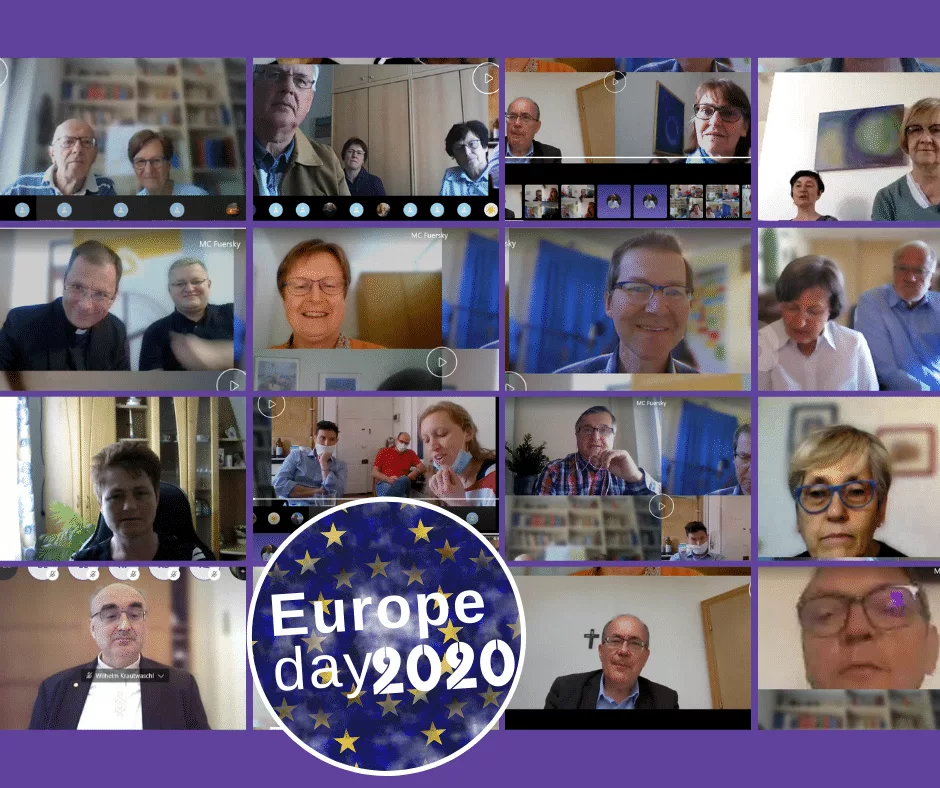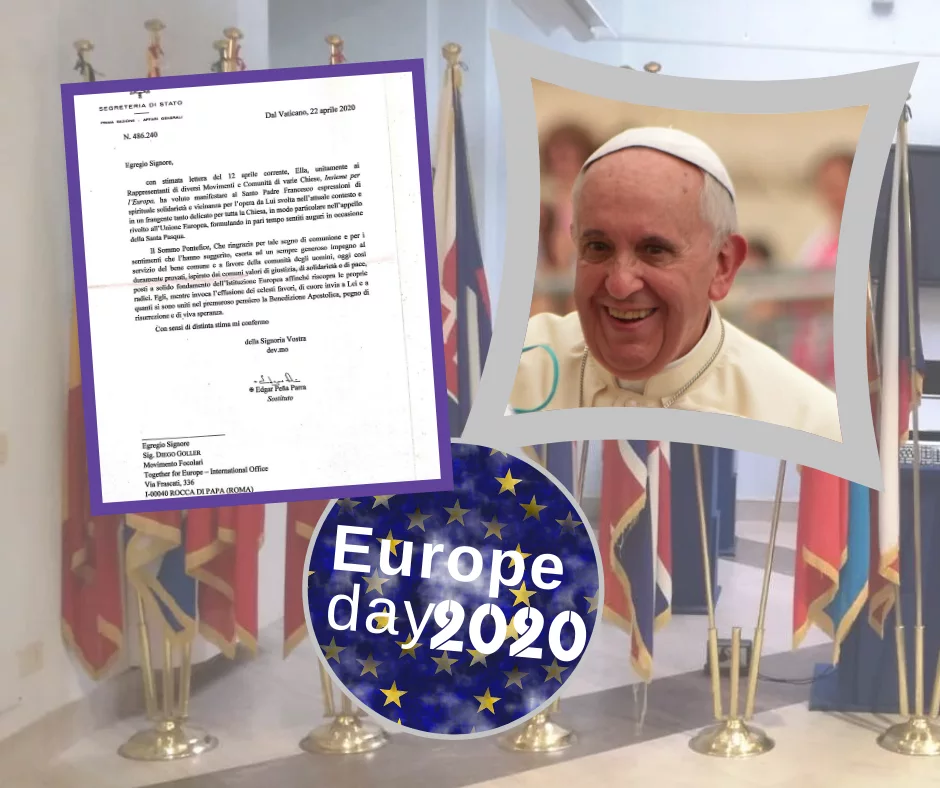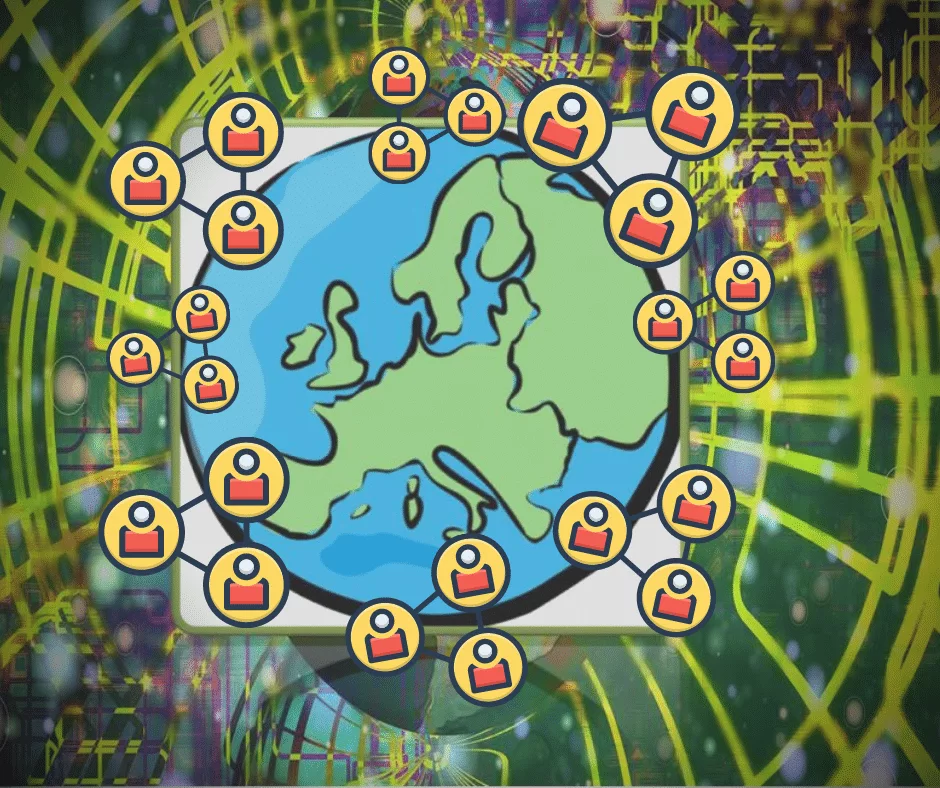
by TogetherforEurope | Sep 2, 2020 | 2020 Friends | Zoom, News
The annual meeting of the “Friends” of Together for Europe will be held on 12-14 November 2020. This time round, however, it will have two parts: national and European.
This year, due to the Covid-19 pandemic, the international Meeting, originally scheduled for Warsaw, Poland, cannot be held with people being physically together.
On a European level, there will be a ZOOM link-up on November 14, 2020. During the day there would be several inputs, sharing (in the four languages: French, English, German and Italian) and a common prayer. The focal point would be the question: How did the various charisms, which are linked together in Together for Europe, tackle the pandemic? Through our sharing we will come to know each other even deeper.
Preparatory national meetings
Prior to our European meeting, we invite you to meet in each Country. The invitation letter stated: “This could take place a few days, or weeks, just proceeding November 14; this meeting could be physical or virtual – depending on the restrictions imposed in each Country”. The aim of the national meetings is to prepare a contribution for the European meeting.
Looking ahead at 2021
Pandemic permitting, the usual Friends’ Meeting on a European level is scheduled for 4 – 7 November 2021, and hopefully we could greet each other physically. The Country and the exact venue have still to be decided.
International secretariat of TfE
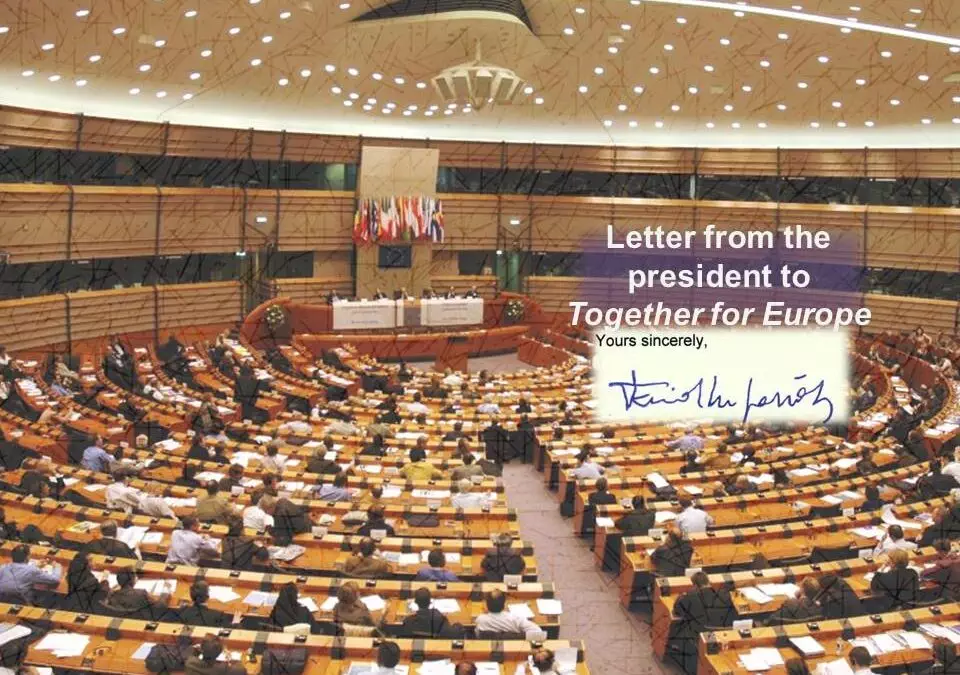
by Heinrich Brehm | Aug 4, 2020 | 2020 Europe Day, Experiences, reflections and interviews, News
Together for Europe has received a letter from David Maria Sassoli, the president of the European Parliament. He emphasized the great need of the common European values to tackle crises. He also added that he would be delighted to keep in contact with our network.
In a letter addressed to Together for Europe (TfE), David Maria Sassoli, the president of the European Parliament, expressed his gratitude to the ecumenical network for its service toward the European Continent. Mr Sassoli observed that even Europe’s Founding Fathers were fully aware that the political project EUROPE could function properly only if nurtured also with a lived-out spirituality. He affirmed that: “European shared values, as agreed upon by Member States when signing the EU Treaties, are more needed than ever to overcome crises, including the current COVID-19 pandemic”.
Fighting selfish egoistic and nationalistic temptations
The president underlined how much he appreciates all the initiatives that “stimulate public discussions on civic matters”. In the European Parliament’s aims and in the commitment of the network Together for Europe, he sees “a shared approach based on solidarity and idealism”. Indeed, the COVID-19 crisis, the need for more ecology and the way the European Union deals with third-county nationals arriving on its territory “are all issues that cannot be tackled without fighting selfish and nationalistic temptations”.
Encouragement for future steps
The ecumenical network considers this letter of appreciation to be an encouragement for future steps. The letter from Brussels shows that prayer and action for Europe, like the initiatives linked to May 9, are an important contribution toward its unity.
Heinrich Brehm / Beatriz Lauenroth
Letter of the president of the European Parliament David-Maria Sassoli to Together for Europe, 7 july 2020
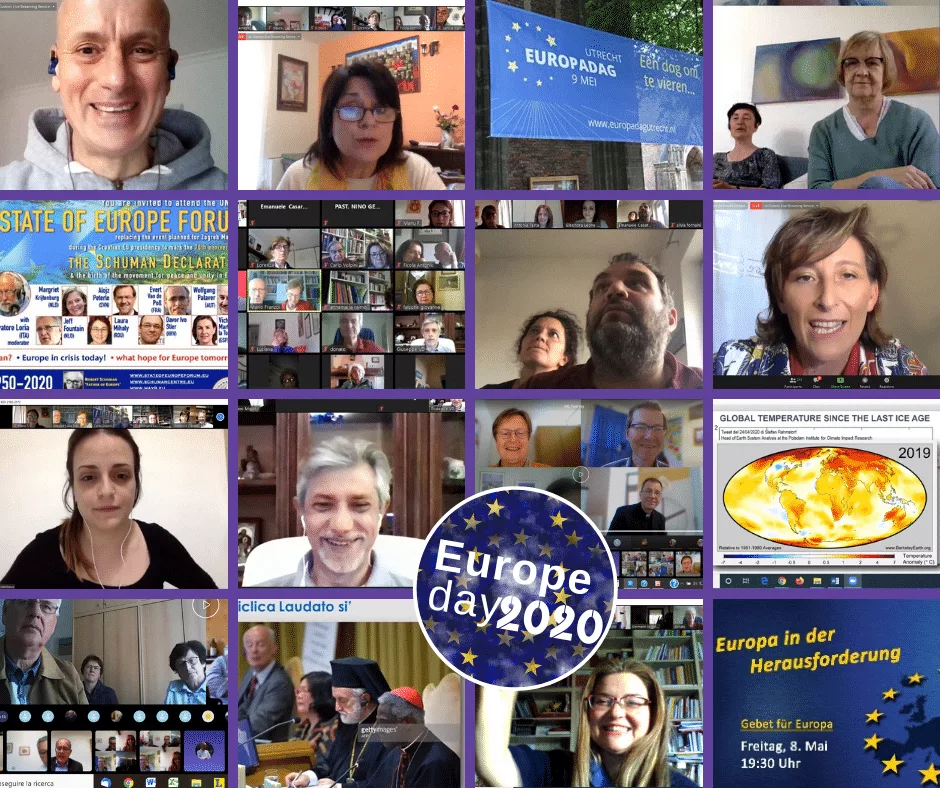
by Beatriz Lauenroth | May 18, 2020 | 2020 Europe Day, News
Living May 9, 2020, online: Due to Covid-19, all the events planned for the Europe Day, which involved Together for Europe were held online. Together for Europe was in contact with persons from all over the Continent through discussions, conferences, prayers and singing.
Italy
In Italy, more than 900 Friends of Together from all over the Country joined in a Zoom conference. The theme was: “Integral ecology: a sustainable utopia for Europe”; two keynote speeches dealt with how to work for the planet’s better present and an even better future by respecting nature and persons. The meeting was concluded with an ecumenical prayer with representatives of numerous Churches and Communities, and with the renewal of the ‘pact’ of mutual love.
The Netherlands
Two conferences, one based in Utrecht and another in Amsterdam, were held in The Netherlands. “Utrecht in Dialogue” and “Pax” provided small online groups with food for thought during their lively discussions regarding ideas about Europe. Many young people took part.
The ‘Schuman Centre’ discussed the present situation of the Continent. 70 years ago, Robert Schuman announced his plan to start laying the foundations for a European Home embracing 500 million inhabitants. Jeff Fountain, the founder of the ‘Schuman Centre’, which was established ten years ago, concluded the discussion with an unusual form of prayer. He sang in English on the tune of “Ode of joy”, the Europahymnus, a rewritten interpretation: “With the vision now before us of a true community / Of all European peoples, rich in our diversiy / Let us pray and work together for our solidarity / Peace, equality and freedom, rooted in your charity.”
Austria and Eastern Europe
The City of Graz was linked to six Countries for an exchange of lived out experiences. The Friends of Together in Austria, Slovenia, Croatia, Slovakia, Hungary and Northern Italy shared how they were living the Covid-19 crisis in the spirit of mutual support. At the end, Bishop Wilhelm Krautwaschl thanked the participants for their witnessing as an international community, and concluded saying: “In spite of our differences and separations, through the cross we are all united one to the other”.
Germany
The YMCA of Esslingen-Stuttgart thought that at the planned prayer meeting, only locals would participate. However, when they moved the event online, the Friends of Together were linked to other Movements in diverse German, Italian and Dutch cities. Indeed, for all of them the evening turned out to be a true experience of Togetherness.
France
In France there were 34 link-ups scattered in Paris, Lyon, Strasbourg, Toulouse and Tours that formed a national network that manifested the diversities between the groups, and, at the same time, a profound mutual esteem. Gérard Testard (Efesia) encouraged the participants to make the ‘French voice’ ever more present in Europe. One of the participants concluded: “It was a moment of fraternity and trust in Europe that filled us all with a new hope”.
Beatriz Lauenroth
The events will be available online in the next few days on:
Italy: facebook.com/Insiemepereuropa.roma>>
Amsterdam : facebook schuman centre>>

by TogetherforEurope | May 17, 2020 | 2020 Europe Day, Italy, News
Europe Day 2020 – “It was a little great miracle… an event in which we participated and not simply assisted at”. This is an immediate feedback – one of many – that we have received.
The preparation
Indeed, we really put our faith in this online opportunity: to be connected just as nature is connected! We had faith in God’s creativity, and within a few days, the Holy Spirit used our ‘few loaves and fishes’ (cf. John 6,9) to bring about an impressive ecumenical event, at which several Christian leaders took part. Their presence all over Italy is the fruit of a long and loving endeavour of communion, dialogue and nurturing of relationships that the various Committees have carried out in every Region. The commitment to build unity was evident in every word, gesture and expression.
The idea was the brainchild of the Rome Committee of the ‘Together for Europe’ network. Then the other Committees in Italy came together to organize this online event, and, notwithstanding the fact that they never met, they all lived a profound experience of brotherhood and the impression was that they have been working together for two months, and not for just two weeks. In practice they lived out among themselves the ‘Pact of mutual love’ (inspired by Jn 13, 34), which is, after all, the foundation of all that is done under the auspices of Together for Europe.
May 9, 2020 at 6 p.m.: Italy TOGETHER online!
The initiative was underwritten by 25 Movements and Communities that adhere to TfE; there were about 500 links connected from all over the Country, and this added solemnity to the Feast of a United Europe! Taking part, among many others, was the Hon. Stefano Fassina and several local administrators. Also, there were 45 ministers of Christian Churches and Communities. Much appreciated were the messages sent by Bishop Giovanni Traettino (Founder of the Pentecostal Church of Reconciliation), which was read out by Pastor Mauro Adragna (C.R.R. Palermo) and by Pastor Luca Maria Negro, President of the Federation of the Evangelical Churches in Italy.
Toward an integral ecology
While commemorating the 70th anniversary of the ‘Schuman Declaration’, the event focused upon the ‘Yes to Creation’, that is, how to protect the natural environment, which is a gift given to us by God, and which we ought to safeguard for future generations. The overall title of the keynote speeches was: “Integral ecology: a sustainable utopia for Europe”. Reflections were offered by Stefania Papa, professor and expert on ecology, and Luca Fiorani, a physicist, who is an expert on climate; there were also video messages by Pope Francis, Patriarch Bartholomew I and Antonio Gutierrez (Secretary General of UNO) on the occasion of the 50th Earth Day. All these instilled an awareness that together we can work for a better present and an even better future, within a framework of respect, cooperation and reciprocity.
Ecumenical prayer
It was in this spirit that the ecumenical prayer was lived out by the representatives of the various Churches. Dr Costantino Vacros (of the Greek Orthodox Church) started by reading Genesis 1, 26 – 31, which was followed by a rich input by the Baptist Pastor Gabriela Lio, President of the Federation of Evangelical Women in Italy. We then prayed with Pastor Nino Genova (New Pentecost Movement) and with diverse representatives of Catholic Movements and Communities. Then all together – joyfully, in full harmony and solemnly – we renewed the Pact of mutual love. We sealed that day with the Our Father, in order to remind ourselves that we are ONE and that together we can bring about a New Humanity.
Emanuela Cannella – Press Office TfE, Rome
You can review the event on facebook TfE Rome>> and on youtube>>.
We propose here some of the still-images made by Emanuela Cannella and Emanuela Fioravanti.

by TogetherforEurope | May 12, 2020 | 2020 Europe Day, Austria, News
“Welcome to you all gathered here in the Graz Town Hall for our meeting on Europe Day!” This was the way we planned to welcome the participants on Saturday, May 9, 2020. However, Covid-19 disrupted all our plans.
Therefore, toward the end of March, our regional team of Together for Europe decided to postpone the meeting for next year, and to offer a simple substitute program via Skype.
The video conference call of Together for Europe, Saturday May 9, 2020
Nevertheless, the ‘makeshift solution’ resulted in an hour-long online meeting with about 100 participants from Austria and five other neighbouring Countries. The participants included Christians belonging to the Roman Catholic Church, the Evangelical Church, the Romanian Orthodox Church and Communities of the Free Churches.
Brief inputs from Slovakia, Hungary, Slovenia, Croatia, Italy and Carinthia provided an updated and authentic insight regarding daily life during the Covid-19 crisis. All the participants were grateful that they could mutually share their experiences and thus become aware of how others are living in their respective Countries. Thus means that, now, they can pray even better for each other.
The diocesan Bishop Wilhelm Krautwaschl, too, took part in this online meeting. He thanked for this experience of communion that goes beyond borders, and concluded by saying “In spite of our differences and separations, through the Cross we are all united one to the other”.
Plans for May 8, 2021…
Naturally, a video conference call cannot take the place of a Day Meeting. Yet, in the present circumstances, by the way this Europe Day 2020 was lived out, Together was strengthened. It was, indeed, a successful preparation for the Day Meeting scheduled for May 8, 2021, when we could, hopefully, truly say: “Grüß Gott hier im Rathaus Graz …!” – “Welcome to Graz Town Hall!”.
The Together for Europe Team, Austria.

by Sr. Nicole Grochowina | May 7, 2020 | 2020 Europe Day, Experiences, reflections and interviews, News
Europe Day 2020 and Pope Francis
We have been journeying together for the last six weeks. During this shared prayerful journey we allowed the Word of God and our reflection regarding Europe (2016) to inspire us, and we included all European Countries in our prayers. Our main objective was to strengthen our yearning to be all one and to mould Europe with the power of prayer.
May 9, Europe Day
Our journey will take us toward May 9, 2020, Europe Day. This Day ought to be a day of encounters between Communities, Movements and Countries. This year, however, due to Covid-19, we cannot gather physically in churches and squares, or hold social events, conferences and prayers.
This does not mean that the Day’s activities have been cancelled; on the contrary: a lot of creativity is being expressed in digital conferences and prayers, discussion groups and on-line dialogue between Communities, Movements and politicians that will be start, for example, from Utrecht, Graz, Rome, Lyon and Esslingen. Here all linguistic and National barriers will be overcome and thus we can reflect together about Europe and to keep the Continent in our prayers.
Letter from Pope Francis
All our events linked to May 9 have a papal blessing. Indeed, Pope Francis, on 22 April, sent a letter to the Secretariat of Together for Europe in Rome in which, after thanking us for our letter of April 12, he encouraged in the service to the common good, inspired by values of solidarity, peace and justice. He pray for us and he warmly sents his apostolic blessing to all of us.
Letter Secretariat of State, Pope Francis, 22 April 2020
Sr. Nicole Grochowina, Christusbruderschaft Selbitz
Photo Pope Francis: Pixabay/Manfred Kindlinger



















